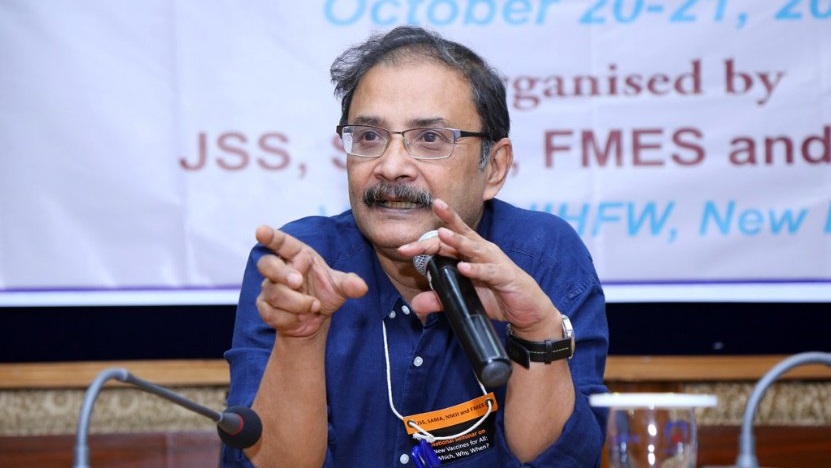On July 5, 2023, the Indian health rights organization Jan Swasthya Abhiyan announced the recipients of the 4th Amit Sengupta Fellowship on Health Rights. The fellowship aims to support health workers and activists in advancing the vision of the right to health spearheaded by Dr. Amit Sengupta. Over the next year, fellows Shivangi Shankar and Saumya Kalia will develop research and reports on health issues faced by the most disadvantaged, following in Dr. Sengupta’s footsteps.
During a panel after the fellowship announcement, journalist Vidya Krishnan described Amit Sengupta as one of the biggest advocates for health rights. “I have sorely missed his voice, especially since the COVID-19 pandemic,” said Krishnan.
Watch | A tribute to Comrade Dr. Amit Sengupta
Krishnan emphasized how Amit Sengupta influenced not only health workers and health activists, but also encouraged reporters to zoom out of the small picture and look at systemic issues. “He trained generations of India’s reporters to think,” she said.
Dr. Chandrakant Lahariya compared Sengupta to the ideal physician described by Rudolf Virchow, who said that doctors should be attorneys for the poor. “Virchow might have said that, but Amit Sengupta lived it,” pointed out Dr. Lahariya.
Amit’s legacy is deeply rooted in the fight for equal access to quality care and medicines. His efforts against the mainstream patent system in India have contributed to recent victories, such as the Indian Patent Office rejecting Janssen’s application for a patent extension on bedaquiline, a drug used to treat tuberculosis (TB).
Read | Yes, we can stop patents getting in the way of TB treatment
Tuberculosis, which affects hundreds of thousands of people worldwide, exemplifies the links between health and other aspects of life highlighted by Amit Sengupta in his activism. Dr. Anurag Bhargava and Meera Yadav, a TB survivor and advocate, pointed out that poor living conditions, including undernutrition and inadequate housing, exacerbate the disease.
Despite long-established TB programs like India’s, the neglect of social determinants of health has largely halted progress. During his earlier TB-related work in rural areas, Dr. Bhargava reported talking to women who, decades after the launch of India’s TB program, had never seen someone being cured of tuberculosis.
India’s homeless population faces similar challenges. Hemant Mohanpuriya, the recipient of the 2022/2023 Amit Sengupta fellowship, focused on the experience of homeless TB patients in Jaipur. Alongside weakened immune systems and stigmatization, they lack access to care, resulting in delayed diagnosis and higher chances of developing drug-resistant TB. This affects all demographics, from young people excluded from national TB programs due to their age, to those living with the disease undiagnosed for decades.
To address this, Mohanpuriya said it is necessary to strengthen TB policies in Jaipur. This includes establishing mobile clinics, training peer health workers, and ensuring that necessary supplies are available at all times. But above all that, added Vidya Krishnan, it is crucial for the government to increase its efforts to counter tuberculosis. While civil society efforts to reduce the burden of tuberculosis have been very important over the past decades, this cannot replace a systemic approach. That is why we need more activists like Amit Sengupta, ready to fight for change, agreed the panelists.
People’s Health Dispatch is a fortnightly bulletin published by the People’s Health Movement and Peoples Dispatch. For more articles and to subscribe to People’s Health Dispatch, click here.





